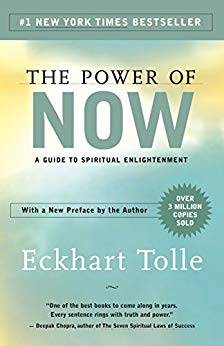

This article is an excerpt from the Shortform summary of "The Power of Now" by Eckhart Tolle. Shortform has the world's best summaries of books you should be reading.
Like this article? Sign up for a free trial here .
Find yourself worrying about the future all day? Do you worry about things that might happen, and get stressed about things you can’t control?
Lots of us do. But worrying about the future is preventing us from living in the present. We’ll learn how to stop worrying about the future and enjoy more of today.
Why You Worry About the Future
When you worry too much on the future, you create anxiety, tension, stress, and worry.
Here’s an example of worrying about the future: You have a pile of bills due next week and are consumed with worry about how you will be able to make ends meet. Instead of dwelling in this future situation, you try to make a plan for how to pay off the bills.
Even if your plan doesn’t solve the issue — as that may not always be possible — spending the meantime panicking creates extra negativity, exhausts your mental and emotional energy, and prevents you from being present. You are gaining nothing from the anxiety.
How to Stop Worrying About the Future: Be Present in Every Moment
The future only exists in projections. When you are present, you experience the only moment that is real — Now. Presence is the only antidote to the control of the ego and the pain-body.
- Much of our pain and distress is self-imposed, from feeding into the pain-body’s negativity and the ego’s power to fill our minds with worry about the past and future.
Being present does not change your external circumstances. It’s not a magic cure. But it does make you better at dealing with the future. When we face hardships in life, being present allows us to tackle them moment by moment. Added stress from our ego-controlled, worried thoughts only makes the obstacles seem more overwhelming. When we are present, we have more mental capacity to face these challenges.
If you are wishing that a situation were different in some way, or you are worrying about some future event, then your thoughts are in the past, future, or some hypothetical scenario — and you are not in the present.
Accepting the present means to acknowledge that it already exists, and that no amount of wishing, complaining, or worrying about the future will change this current moment. This is how you stop worrying about the future.
Does this seem easier said than done? Presence is a simple concept but is not necessarily an easy practice. Most of us are in the habit of letting our egos run the show, so keeping our focus on the present will be like a muscle you strengthen with time and practice.
The power of Now is the power of being present. Presence is the only way to feel peace and true fulfillment. We’ve explored how not being present makes us unhappy and unfulfilled, and how our ego uses thoughts and emotions to prevent us from being present. Now that we’ve identified the problem, we’re going to talk about how you can become more present, and how it will impact your life.
Resisting the Now Creates Pain
Being present and stopping your worry about the future does not change your external circumstances. In fact, life consists of cycles of success and failure; each one is a necessary precedent of the other. These cycles can last from a few hours to years, and are part of the inevitable impermanence of everything in life. (There are also cycles of highs and lows when it comes to your physical energy, productivity, and creativity.)
When you are present, you must accept the lows as much as the highs as part of the reality of the Now. Why fight a cycle that is inevitable?
Much of the pain you experience when worrying about the future or resisting the present is self-inflicted because you’re not accepting the reality of the present moment. The circumstances of your life — your “life situation” — can be unpleasant, but begrudging them does nothing to change the situation. When you resist the Now you are only creating negativity and unhappiness for yourself.
- Negativity manifests as irritation, anger, depression, despair, and resentment.
- This resistance even creates physical tension in your body. (e.g. Do you ever feel stiffness in your back and shoulders from stress? Or clench your jaw or grind your teeth without realizing it?)
When you feel resistance and negativity build in you, especially, as you worry about the future, observe your worry. Put your attention on it, acknowledge it, and then drop it.
- If you can’t drop it, then accept it. Don’t resist it. Accept that you’re worrying about the future, and avoid or judging or blaming yourself for that reaction.
- If you can’t drop it, you can also practice making yourself “transparent” to the irritation. Imagine the solidity of your body dissolving, and allow the future worry to pass right through you. Break down the “wall” inside you that the irritant (e.g. a loud noise, a rude comment, an inconvenient circumstance) is bumping up against, and let it pass through you.
Now that we know that there is power in being present, let’s examine what keeps pushing your thoughts away from the Now: It’s that voice inside your head. It can be characterized as the devil or angel on your shoulder. It is the voice that analyzes what’s going on around you, comments on your interactions, speculates about the future, complains, likes or dislikes things, and makes you question yourself in moments of doubt. This internal voice is the ego.
What Is the Ego?
The ego is a part of your mind that tries to control your thinking and behavior. The ego makes you worry about the future.
The ego gives you an interpretation of the world, not a true reflection. The only true way to see the world is by being fully present and experiencing the Now, without judging or analyzing it.
(Shortform suggestion: Think of your mind as the screen in a movie theater — it can have rips, wrinkles, and other flaws that distort the movie being projected. Each one of us is watching the movie of life play on our own screens, which all have wear-and-tear from our past experiences, cultural conditioning, and other influences from our ego-created identity.)
The ego only has as much power as you give it, and it gains power when you identify with it.
You can feel your true Being when you are present in the Now, so the ego is also threatened by presence. In the interest of self-preservation, your ego will do whatever it can to prevent you from being present and identifying with your true self. Your ego will try to prevent you from stopping your worry about the future.
- The ego is the force pushing your attention away from the present to dwell on the future.
- The mind can only function in the past and future, because they only exist in your mind (in memories and projections). But the ego has no control over the present, so it pulls you away from the Now.
The Ego Always Makes You Feel Lacking or Incomplete
The ego’s lacking feeling can create an intense, ego-fueled craving or desire for possessions, money, success, power, recognition, a relationship, or another temporary pleasure to fill that void. This is a big cause of worry about the future.
The ego falsely believes that temporary pleasures can make you feel complete. When we identify with our mind, we identify with those desires and cravings. We seek fulfillment and happiness through acquiring those things, but although they may momentarily satiate the craving, satisfying a desire will never bring peace and enlightenment.
- In an extreme form, these cravings become addictions.
- The Buddha says that pain and suffering come from desire and craving.
Desires and cravings keep our focus in the future: “Once I attain this, I will be happy.” That mindset keeps us out of the present moment, which is the only place to find peace and enlightenment.
Your desires may even include enlightenment. You might think, “I will work to achieve enlightenment, and when I reach it, my life will be better.” Although enlightenment does bring joy and peace, your ego is still placing that in the future. Instead, you can experience joy and peace now by being present. Being present is how you stop worrying about the future.
Use Your Mind; Don’t Let It Use You
Presence does not mean never using your mind, but rather using it deliberately. Your mind is a tool; use it productively for specific tasks, then put it to rest.
Pay attention to your thoughts: How often do you think about the past, future, or something that is not helping you with the task at hand? Are you in control of your thoughts, or are they taking you on a ride?
Many of us spend unnecessary time and energy in repetitive and unproductive thoughts that can actually do more harm than good. The mind becomes dangerous when it stops being a tool that we use, and instead has control over us, as we discussed earlier.
When you use our mind only for practical purposes, instead of leaving it running all day, it will be sharper and more focused when you need it.
- (Shortform note: Research reveals that overthinking depletes our limited supply of working memory, which allows us to focus on cognitively demanding tasks, as well as willpower.)
If you stay present in the Now and face a situation that needs immediate action, you will be able to act with clarity and awareness.
- In a life-or-death situation, people just act. They don’t have time to analyze the situation or panic about what a terrible problem it is. They just do what needs to be done.
- By the same token, some people find presence by pursuing life-threatening situations or adrenaline-filled activities, because they are so extreme that your whole body and mind focus on the Now.This is why some adrenaline junkies get hooked on extreme and dangerous activities.
———End of Preview———

Like what you just read? Read the rest of the world's best summary of "The Power of Now" at Shortform . Learn the book's critical concepts in 20 minutes or less .
Here's what you'll find in our full The Power of Now summary :
- Why you feel pain from the past, and how to get rid of it
- How to be more present and stop worrying about the future
- The 8 key ways to achieve mindfulness






